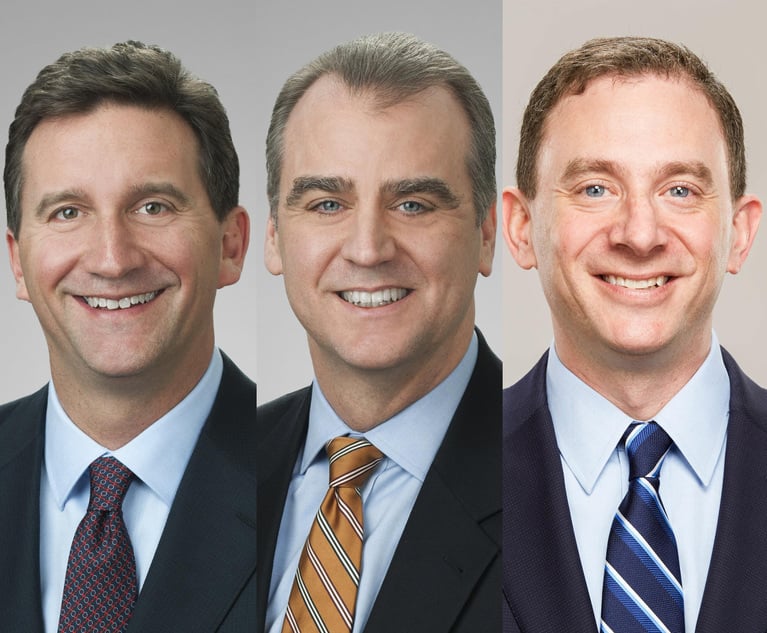No Harm, No Foul? Courts Face Controversy Over Uninjured Antitrust Class Members
Antitrust defendants have long argued that a class may not be certified if it includes members who have suffered no demonstrable injury. But is this argument gaining traction?
February 27, 2020 at 01:27 PM
5 minute read
The original version of this story was published on National Law Journal

For years, defendants in antitrust suits have argued that a class may not be certified if it includes members who have suffered no demonstrable injury. Recent developments suggest that argument may be gaining traction.
In In re Rail Freight Fuel Surcharge Antitrust Litigation, the U.S. Court of Appeals for the D.C. Circuit in 2019 addressed allegations that four railroad companies, who collectively control almost 90% of the rail freight traffic in the U.S., conspired to fix fuel prices in violation of antitrust laws. As in any complex antitrust class action, the plaintiffs proposed to show damages via statistical modeling. Their model reflected that approximately 2,000 customers, or about 12% of the class, were actually undercharged by the pricing scheme. In other words, they were not injured.
The issue before the court in Rail Freight was whether the inclusion of those uninjured class members precluded certification under Federal Rule of Civil Procedure 23. Under Rule 23(b)(3), the "predominance" factor, common questions of fact or law must predominate over individual questions. Without predominance, a class action would be either inefficient or unfair: The court would have to hold countless "mini-trials" on the individualized questions, or it would have to deprive a party of the opportunity to prove its case with respect to those questions.
The case presented a significant predominance problem. The plaintiffs' model reflected that thousands of customers were not injured by the scheme. But the model did not identify which customers were uninjured. Thus, even if the existence of the scheme was proved, the court would still have to sort through every customer to decide whether it was or was not injured. Or so the defendants argued.
Judge Paul L. Friedman of the U.S. District Court for the District of Columbia disagreed that the inclusion of uninjured members in a class necessarily created a predominance problem. Under the "de minimis exception," if the class includes a small number of uninjured members, and there is an easy way of identifying those members, the class could be certified. But the court concluded that 12% was more than de minimis and denied certification. The D.C. Circuit affirmed, assuming, without deciding that a de minimis exception exists.
The D.C. Circuit is not the first court to address uninjured class members. Four years ago, in Tyson Foods v. Bouaphakeo, the Supreme Court upheld certification of a class containing uninjured class members. Unlike the courts in Rail Freight, the Supreme Court suggested the issue may be one of claims administration, not certification. Recognizing that "the question whether uninjured class members may recover is one of great importance," the court declined to answer it, holding that the defendant could raise the issue once a claims-administration procedure was proposed.
Since Tyson Foods, other courts have weighed in on the issue. In 2018, the First Circuit in In re Asacol Antitrust Litigation addressed a suit by pension funds against a pharmaceutical manufacturer. As in Rail Freight, statistical models showed that approximately 10% of the proposed class was uninjured, but there was no easy way of identifying who fell into that category. As a result, the court ruled, the class could not satisfy the predominance requirement. Therefore, the class could not be certified. The court did not outright reject the idea of a de minimis exception, but it did express disapproval of other decisions embracing it.
The courts are now split over whether Rule 23 allows a de minimis exception, permitting certification despite a small number of uninjured class members. The Seventh Circuit, in Messner v. Northshore University HealthSystem, addressed the issue in the context of a merger challenge. In 2012, it held that a class containing "a great many" uninjured members could not be certified. The court went on to find that 2.4%—the amount of uninjured class members, by the defendant's estimation—did not amount to "a great many." The Ninth Circuit has also suggested, in the 2016 case Torres v. Mercer Canyons, that it would permit a de minimis exception.
The Fifth Circuit, on the other hand, has rejected such an exception. In the 2003 decision, Bell Atlantic v. AT&T, the court held that "where fact of damage cannot be established for every class member through proof common to the class, the need to establish antitrust liability for individual class members defeats Rule 23(b)(3) predominance." The Third Circuit reached a similar conclusion in In re Hydrogen Peroxide Antitrust Litigation, noting that the issue of antitrust impact is "an element of the claim that may call for individual, as opposed to common, proof," requiring "the district court's rigorous assessment of the available evidence and the method or methods by which plaintiffs propose to use the evidence to prove impact at trial."
The controversy over uninjured class members and whether Rule 23 permits a de minimis exception will persist until resolved by the Supreme Court. Until then, counsel will have to consider carefully how to structure proposed classes to minimize the risk that their efforts will be thwarted by the inclusion of uninjured members.
Lauren M. Weinstein is a partner in MoloLamken's Washington, D.C., office. Before joining MoloLamken, she was a law clerk to the Hon. M. Margaret McKeown of the U.S. Court of Appeals for the Ninth Circuit and the Hon. John G. Koeltl of the U.S. District Court for the Southern District of New York. Leonid Grinberg is an associate in MoloLamken's New York office. Before joining MoloLamken, he clerked for the Hon. Frederic Block of the U.S. District Court for the Eastern District of New York.
This content has been archived. It is available through our partners, LexisNexis® and Bloomberg Law.
To view this content, please continue to their sites.
Not a Lexis Subscriber?
Subscribe Now
Not a Bloomberg Law Subscriber?
Subscribe Now
NOT FOR REPRINT
© 2025 ALM Global, LLC, All Rights Reserved. Request academic re-use from www.copyright.com. All other uses, submit a request to [email protected]. For more information visit Asset & Logo Licensing.
You Might Like
View All
Litigators of the (Past) Week: Defending Against a $290M Claim and Scoring a $116M Win in Drug Patent Fight

Big Company Insiders See Technology-Related Disputes Teed Up for 2025
Trending Stories
- 1Many LA County Law Firms Remain Open, Mobilize to Support Affected Employees Amid Historic Firestorm
- 2Stevens & Lee Names New Delaware Shareholder
- 3U.S. Supreme Court Denies Trump Effort to Halt Sentencing
- 4From CLO to President: Kevin Boon Takes the Helm at Mysten Labs
- 5How Law Schools Fared on California's July 2024 Bar Exam
Who Got The Work
Michael G. Bongiorno, Andrew Scott Dulberg and Elizabeth E. Driscoll from Wilmer Cutler Pickering Hale and Dorr have stepped in to represent Symbotic Inc., an A.I.-enabled technology platform that focuses on increasing supply chain efficiency, and other defendants in a pending shareholder derivative lawsuit. The case, filed Oct. 2 in Massachusetts District Court by the Brown Law Firm on behalf of Stephen Austen, accuses certain officers and directors of misleading investors in regard to Symbotic's potential for margin growth by failing to disclose that the company was not equipped to timely deploy its systems or manage expenses through project delays. The case, assigned to U.S. District Judge Nathaniel M. Gorton, is 1:24-cv-12522, Austen v. Cohen et al.
Who Got The Work
Edmund Polubinski and Marie Killmond of Davis Polk & Wardwell have entered appearances for data platform software development company MongoDB and other defendants in a pending shareholder derivative lawsuit. The action, filed Oct. 7 in New York Southern District Court by the Brown Law Firm, accuses the company's directors and/or officers of falsely expressing confidence in the company’s restructuring of its sales incentive plan and downplaying the severity of decreases in its upfront commitments. The case is 1:24-cv-07594, Roy v. Ittycheria et al.
Who Got The Work
Amy O. Bruchs and Kurt F. Ellison of Michael Best & Friedrich have entered appearances for Epic Systems Corp. in a pending employment discrimination lawsuit. The suit was filed Sept. 7 in Wisconsin Western District Court by Levine Eisberner LLC and Siri & Glimstad on behalf of a project manager who claims that he was wrongfully terminated after applying for a religious exemption to the defendant's COVID-19 vaccine mandate. The case, assigned to U.S. Magistrate Judge Anita Marie Boor, is 3:24-cv-00630, Secker, Nathan v. Epic Systems Corporation.
Who Got The Work
David X. Sullivan, Thomas J. Finn and Gregory A. Hall from McCarter & English have entered appearances for Sunrun Installation Services in a pending civil rights lawsuit. The complaint was filed Sept. 4 in Connecticut District Court by attorney Robert M. Berke on behalf of former employee George Edward Steins, who was arrested and charged with employing an unregistered home improvement salesperson. The complaint alleges that had Sunrun informed the Connecticut Department of Consumer Protection that the plaintiff's employment had ended in 2017 and that he no longer held Sunrun's home improvement contractor license, he would not have been hit with charges, which were dismissed in May 2024. The case, assigned to U.S. District Judge Jeffrey A. Meyer, is 3:24-cv-01423, Steins v. Sunrun, Inc. et al.
Who Got The Work
Greenberg Traurig shareholder Joshua L. Raskin has entered an appearance for boohoo.com UK Ltd. in a pending patent infringement lawsuit. The suit, filed Sept. 3 in Texas Eastern District Court by Rozier Hardt McDonough on behalf of Alto Dynamics, asserts five patents related to an online shopping platform. The case, assigned to U.S. District Judge Rodney Gilstrap, is 2:24-cv-00719, Alto Dynamics, LLC v. boohoo.com UK Limited.
Featured Firms
Law Offices of Gary Martin Hays & Associates, P.C.
(470) 294-1674
Law Offices of Mark E. Salomone
(857) 444-6468
Smith & Hassler
(713) 739-1250








